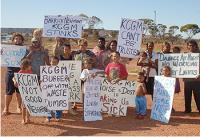 | | HARD YAKKA: Ninga Mia residents protest against the encroaching KCGM super pit. Picture: Tony Holmes. |
Kalgoorlie's
super pit may be the goose that laid the golden egg, but moves to
expand Australia's biggest goldmine are being bitterly opposed by
neighbours.
WA's top mining engineer does not believe it
has been proven that there will be no risk in enlarging the Kalgoorlie
Super Pit to within 200m of homes and roads.
The pit extension has been recommended for approval by the Environment Protection Authority.
But the approval flies in the face of serious concerns raised by the Department of Consumer and Employment Protection.
Emails
from DOCEP state mining engineer Martin Knee to an EPA
senior-assessment officer cautioned that the project's technical blast
report lacked "sufficient risk information''.
"This new document
does not appear to me to provide sufficient risk information to enable
the conclusion to be drawn that risk from fly-rock is as low as
reasonably achievable,'' Mr Knee wrote on December 4, 2007, before the
EPA's recommendations.
"In fact, it does not seem to address the absolute value of the risk involved in either a quantitative or a qualitative fashion.
"There
may be nothing wrong with this approach, however, my contention is
simply that is does not, in fact, even address the issue of whether the
risk involved is as low as reasonably achievable.''
As gold
prices rise to nearly $US1000 an ounce, joint owners of the
controversial Kalgoorlie Super Pit mine, Newmont Mining and Barrick
Gold, want to dig deeper.
They propose to extend the depth of
their quarry to 600m, a feat that will uncover billions of dollars of
gold and prolong the mine's life by another five years -- to 2017.
The problem is to keep the pit walls stable. As the hole goes deeper, it must also go outwards.
The
site is mostly bordered by waste dumps that are full of cyanide and
hypersaline water so the mine can extend only towards Boulder.
Last
December the EPA advised WA Environment Minister David Templeman to
approve the expansion, called the Golden Pike Cutback, as long as
mining operations would not occur within 400m -- a previously agreed
minimum "safe'' distance from flying rock, noise and dust pollution --
of properties zoned residential.
This means homes classed
otherwise, such as those zoned rural or light industrial, will be
inside the safety exclusion zone -- 200m from the edge of a 600m-deep
hole.
The pit's destiny is now in the hands of Mr Templeman.
Environmental
campaigners and Kal- goorlie-Boulder residents are accusing the mine of
putting money before safety. They say people will be allowed to walk
into a public street that will be within 150m of rock blasting.
In
an environmental report, Kalgoorlie Consolidated Gold Mines said it
believed "the performance of its operation and management programs
showed that a mining operation of this nature could operate in close
proximity to a community without adverse impact or the need for a large
buffer zone''.
The local indigenous Ninga Mia community says the levels of noise and dust from mining operations are making them sick.
"They are trying to surround us with waste dumps and drive us out of our homes,'' Ninga Mia resident Lynette Morrison said.
When
asked about the Ninga Mia complaints KCGM's general manager, Russell
Cole said: "In the absences of any formal complaints to us by Ninga Mia
or any government department, we can only assume we have a good
relationship with this community.
"We encourage anyone from Ninga Mia to contact us if they have any concerns.''
Kalgoorlie-Boulder
Mayor Ron Yuryevich said the Government had not yet responded to his
calls for a guarantee the pit would be stable after its extension.
Over 18 months, 86 blasts will be required to complete the first four benches of the Golden Pike Cutback.
According
to KCGM's public environmental review document, of these blasts, 58
will have a potential blast clearance area of less than 400m.
EPA chairman Paul Vogel declined to comment. | 


